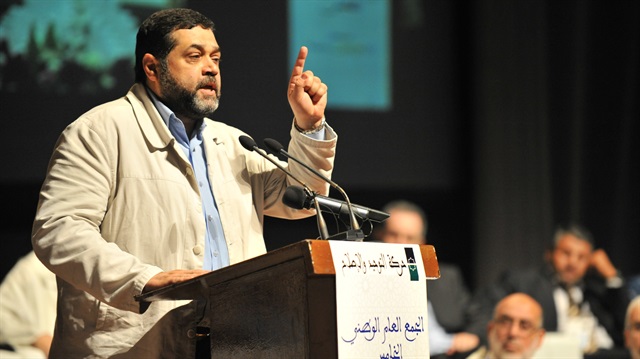

Osama Hamdan
The new Hamas charter accepts a Palestinian state on the pre-1967 border
Palestinian resistance group Hamas has received "positive" responses from European countries on its new charter, a senior group leader said Sunday.
“Many European capitals have dealt positively with our new political document," Osama Hamdan, head of international relations in Hamas, said in an exclusive interview with Anadolu Agency.
"We got positive responses from Sweden and Norway along with positive signs from Britain in addition to supportive positions from Russia and China,” he said.
In May, Hamas unveiled a revised charter that accepts a Palestinian state along the borders set before Israel occupied the West Bank and Gaza Strip during the 1967 Arab-Israeli war.
The U.S., however, said its position on Hamas remains unchanged despite the group's new charter.
While Washington blacklisted Hamas in 1997, many countries consider the group a legitimate political actor.
"The U.S. administration always stands beside Israel, since they maintained the same position [Israeli Prime Minister Benjamin] Netanyahu adopted towards the document," Hamdan said.
The Hamas leader said that his group is a resistance group seeking to liberate Palestinian lands occupied by Israel.
"We represent a lucid movement that struggles to restore usurped rights of its people, who have been living under occupation for decades," he said.
- Egypt relations
In recent years, relations between Hamas, which rules the Gaza Strip, and Egypt have strained amid Egyptian accusations for the group of interfering in its internal affairs.
However, relations have recently improved with the two sides reaching understandings regarding maintaining border security.
"Our understandings with Egypt did not come all of sudden, but came as a result of three years of mutual trust," Hamdan said.
"We have managed to prove for our brothers in Egypt that all charges against Hamas of interfering in Egypt’s internal affairs were totally fake,” he added.
Last month, Hamas began building a buffer zone along border between the Gaza Strip and Egypt's Sinai Peninsula, which has been hit by a militant insurgency since 2013.
“We are very keen on building robust and healthy relations with brothers [in Egypt] with a view to alleviating the suffering of people in Gaza,” Hamdan said.
Home to nearly two million Palestinians, the Gaza Strip has been reeling under a crippling blockade by Israel since 2007.
In recent days, Egyptian authorities allowed trucks loaded with industrial fuel to enter Gaza for re-operating the enclave’s only functioning power plant after a two-month hiatus.
The move was reportedly part of understandings reached between Hamas, Egypt and exiled Fatah leader Mohamed Dahlan, which Hamas considers as its foe.
Asked about Hamas's relations with Dahlan, who is currently based in the United Arab Emirates, Hamdan said “Hamas cannot be a bridge for the return of people who think they can surrender the rights of Palestinian people.”
“But, we are ready to be bridges for anyone who holds the project of the resistance and the full liberation of Palestine,” he added.
- National reconciliation
Hamdan said national reconciliation is a main goal for Hamas.
“Despite the steps taken by Palestinian President Mahmoud Abbas against Gaza, we have repeatedly said that internal reconciliation is a principal issue for us,” he said.
“We in Hamas opened all doors for the [Ramallah-based] unity government to practice its tasks freely in the Gaza Strip,” he added.
Hamas and rival Fatah group, which dominates the Palestinian Authority (PA), have been at odds since the former routed PA forces from Gaza after infighting.
In April of 2014, the two groups signed a long-awaited reconciliation agreement that called for the formation of a Palestinian unity government tasked with overseeing Palestinian legislative and presidential polls.
Although the unity government was unveiled two months later, it never took on a governing role in the Hamas-run Gaza Strip, while the relationship between Hamas and Fatah remains beset by a host of outstanding differences.
In April, Abbas vowed to take “unprecedented steps” to pressure Hamas into relinquishing control of the Gaza Strip.
And in June, Israel began reducing the electricity supply to Gaza -- a move it says came at the request of the Ramallah-based Palestinian Authority.
“Abbas seeks by these sanctions to incite against the Gaza-based resistance, forgetting that these steps would have consequences on the economic, social, political aspects inside Gaza," Hamdan said.
- Gulf crisis
Meanwhile, the Hamas leader called for dialogue to resolve an ongoing crisis between a number of Arab countries and Qatar.
“We feel pain for what is going on in the Gulf countries as it took place between brothers and the Gulf house was seen solid until this crisis,” Hamdan said.
"We call for solving this problem through dialogue which prioritizes the interests of the whole region not the interest of Israel.”
On June 5, Saudi Arabia, Egypt, the United Arab Emirates (UAE) and Bahrain cut diplomatic relations with Qatar, accusing Doha of supporting terrorism.
Saudi Arabia also sealed its land border with Qatar, geographically isolating the tiny Gulf nation.
Qatar, for its part, denied the accusations, saying the move to isolate it diplomatically was "unjustified" and in breach of international law.
#Egypt
#HAMAS
#Osama Hamdan
#Palestine

